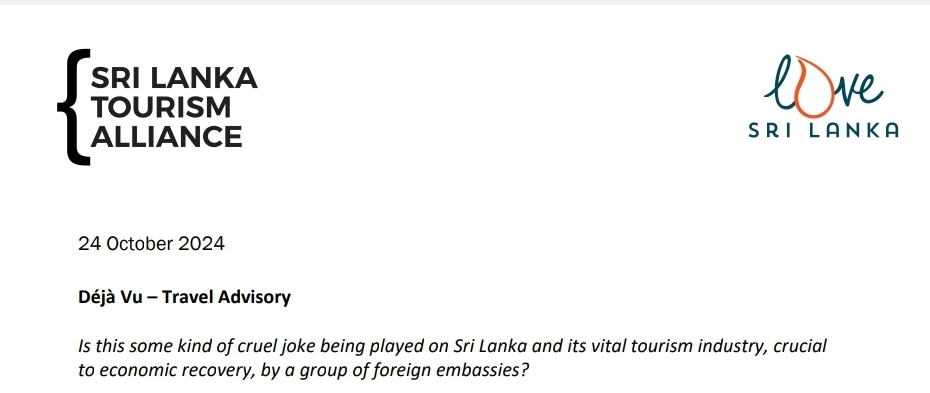
by Malik J. Fernando
Chair, Sri Lanka Tourism Alliance
Déjà Vu – Travel Advisory
Is this some kind of cruel joke being played on Sri Lanka and its vital tourism industry, crucial to economic recovery, by a group of foreign embassies?
In early October, Sri Lankan authorities raised an alert on a potential threat in Arugam Bay, a remote village on the east coast popular with Israeli surfers, far from the usual tourist circuits.
Such security alerts are commonplace globally. Following the alert, security measures were increased, two arrests were made, and no incidents were reported. Authorities are confident in their response.
The local population in Arugam Bay is predominantly Muslim, unlike the largely Buddhist and Hindu rest of the country. Typically, over 50% of tourists in Arugam Bay are from Israel, many visiting after military service. Tensions arose between residents and tourists due to illegal businesses run by tourists using foreign currencies and issues related to visa overstays, which unfortunately have not been effectively addressed by the state.
Additionally, the construction of a new synagogue next to a mosque contributed to friction, and the synagogue was provided security as a precaution. Despite these tensions, there has been no history of even minor attacks, and Sri Lanka remains hospitable to all.
Local activists had called on social media for a boycott of Israeli-operated businesses in Arugam Bay, which are anyway illegal. It is currently the off-season in Arugam Bay, and hardly any tourists remain.
On October 23, the US Embassy in Colombo issued an alert about a threat in Arugam Bay.
This was then amplified by Israeli media, suggesting that all of Sri Lanka was unsafe for Israelis, which is absurd. Many are shopping in Colombo this morning.
The UK quickly followed suit, issuing a new advisory implying that all of Sri Lanka is dangerous, stating, “Terrorists are very likely to attempt attacks in Sri Lanka,” without a shred of additional evidence, merely citing the earlier US alert about Arugam Bay.
Travel advisories are blunt tools, where diplomats often jump at the slightest “intelligence” to play it safe. For example, the Australian advisory on Germany states, “Exercise a high degree of caution in Germany due to the threat of terrorism.”
Of course, few people traveling to Germany would read such an advisory. However, in countries like Sri Lanka, where international tourism communication is virtually non existent, advisories play a disproportionate role in misleading travellers.
While risks are being widely publicized, diplomats privately express comfort with the measures taken by Sri Lankan authorities regarding the alert about Israeli travellers.
Authorities must also shut down illegal businesses and ensure that anyone overstaying a visa is deported, as is the norm in most countries.
The uncalibrated response from foreign embassies displays callousness towards Sri Lanka and its tourism sector, which plays a critical role in uplifting millions in rural communities still recovering from recent serious economic setbacks.
What looked to be a promising winter tourism season can now be impacted, as the US advisory is amplified by the UK and subsequent international media coverage. Each booking is vital to Sri Lanka’s recovery. We are hopeful that prospective guests will see beyond the smoke and mirrors and continue to book Sri Lanka.
Despite the reckless actions of those with megaphones, Sri Lankans remain hospitable and welcoming to travellers from around the world. If we have been over-hospitable in the past,this should be addressed, and laws enforced to ensure the country and its people are not taken advantage of.
We look forward to welcoming travellers from every country and promise you a memorable stay on our beautiful island.
